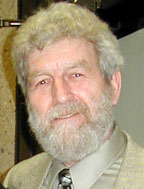 |
Editor's notes
By Chuck Armsbury, Senior Editor
 I like
it when the gods visit earth. They trek down that mountain of
privilege into the valley of need. Sometimes they arrive by jet,
put on their cowboy boots and go rural. Such a heavenly day happened
in Eastern Washington recently, and hardly anyone called it a
miracle. I like
it when the gods visit earth. They trek down that mountain of
privilege into the valley of need. Sometimes they arrive by jet,
put on their cowboy boots and go rural. Such a heavenly day happened
in Eastern Washington recently, and hardly anyone called it a
miracle.
Two of the most powerful gods, U.S. Supreme Court Justices Sandra
Day O'Connor and Stephen Breyer, visited our region on July 18
for a trip without black robes into the world of Strong Heart
Court. Miracle of miracles, these powerful judicial gods came
to learn from a lowly judge on the Spokane Indian Reservation.
"They watched in Strong Heart Court as a team of 10 people
decided the best way to help juvenile drug users," wrote
Jim Camden of the Spokesman-Review. "They joined in the
applause as teens battling alcohol or drug use were lauded for
a week of clean drug tests or faithful attendance at counseling
sessions. They heard the debates over whether to send teens with
repeated failures or absences to detention or treatment centers."
Strong Heart Court is in Wellpinit, Washington on the Spokane
Reservation, a small piece of land a few miles northwest of the
city of Spokane, dry land where acclaimed poet Sherman Alexie
was raised. The Spokane tribe started this unique court last
March after receiving "the first payment in a three-year,
$500,000 federal grant" that "uses a holistic approach
reaching into the tribe's traditions of involving the entire
community to help a member in trouble," according to Camden.
Spokane tribal leaders hope the visit will highlight their innovative
concepts and make the point that tribal courts are separate but
equal players in the nation's judicial system - atop which Justices
O'Connor and Breyer sit. Strong Heart Court is an experiment
designed to eventually replace an existing, failed system of
standard detention, probation and treatment.
Tribal leaders called it Strong Heart Court because Wellness
Court sounded too "New Age," and "Drug Court"
sounded too negative. Breyer and O'Connor both came away with
praise for the system, and so what is Spokane Tribal Court Associate
Judge Conrad Pascal doing so interesting to attract these judicial
gods?
The key to Strong Heart Court, apparently, is the large group
of people who become part of a solution for the accused person's
problems. "There are a significant number of people who
are focused on 'What do we do with this person,'" Breyer
said. "It's the right thing for this community."
Tribal members between 12 and 20 can be referred to the court
for alcohol or drug abuse or for minor criminal offenses. During
the yearlong program, an accused member must submit to three
drug tests, go to two group therapy sessions, one individual
session and Talking Circle each week. Talking Circle is a tribal
concept that Judge Pascal introduced to the reservation's court
system years ago when he was "running into a wall"
with a particularly tough case.
Pascal told Justices O'Connor and Breyer that one, frustrating
day in court he took off his robe, stepped away from the bench
and joined the defendant and her family in the seats as "a
friend who wants to help." Together, they then sat in a
circle and passed around an eagle feather to keep discussion
going. Eagle feathers are thought to hold special messages for
the group and are sometimes given to defendants to help them
through tough times.
It doesn't always work. "Timing is everything," said
Judge Pascal. "The person has to be ready to listen, but
not so far out of control that he or she can't be helped."
O'Connor, apparently having epiphanies, remarked to the Review
that "the Talking Circle reminded her of things that were
tried in some juvenile courts in the 1960s." I wonder if
she means the reform principle tried in adult and juvenile courts
in the 1960s that appears in this line from a Virginia Law Review
article in June 1969 by Philip J. Hirschkop and Michael A. Milleman:
"The judiciary functions as more than a final arbiter; it
has a responsibility for educating the public and, where it fails
to act, it functions to legitimize the status quo."
This is what we all want to know: are the Supremes only legitimizing
the status quo? Or was it something else that she experienced
during the 1960's that had her reminiscing?
So off go our Supreme Court gods to new horizons of learning
and educating about what systems must eventually replace the
miserably failing U.S. drug war. To learn even more, these two
judicial educators then flew off to the Navajo Reservation to
continue their enlightenment. Who will educate the educators?
We will! 

|

